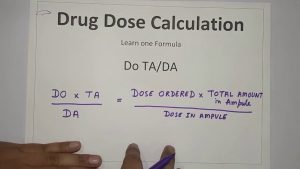In the healthcare industry, the role of nurses is pivotal. They are often the primary caregivers, spending the most time with patients, and ensuring that medical treatment plans are followed correctly. One critical skill that nurses must master is dosage calculation. Accurate dosage calculation is essential for patient safety, effective treatment, and overall healthcare quality. This blog will delve into the reasons why nurses need to be proficient in dosage calculation.
 Ensuring Patient Safety
Ensuring Patient Safety
The foremost reason for nurses to learn dosage calculation is patient safety. Medication errors can have serious, sometimes fatal, consequences. Incorrect dosages can lead to adverse drug reactions, underdosing, or overdosing. By mastering dosage calculations, nurses can minimize these risks. Accurate calculations ensure that patients receive the correct amount of medication, tailored to their specific needs, body weight, age, and medical condition. This precision is especially crucial in pediatrics and geriatrics, where patients are particularly vulnerable to dosage errors.
Enhancing Professional Competence
Competency in dosage calculation is a fundamental aspect of nursing education and practice. It enhances a nurse’s professional competence and confidence. Proficient dosage calculation skills allow nurses to administer medications accurately and efficiently, improving their overall performance. This competence not only boosts the nurse's confidence but also reassures patients and their families about the quality of care being provided.
Compliance with Legal and Ethical Standards
Nurses are bound by legal and ethical standards to provide safe and effective care. Medication administration is a significant aspect of this responsibility. Errors in dosage calculation can lead to legal ramifications and damage to a nurse’s professional reputation. By ensuring accurate dosage calculations, nurses comply with their ethical duty to “do no harm” and their legal obligations to deliver safe care

 Ensuring Patient Safety
Ensuring Patient Safety